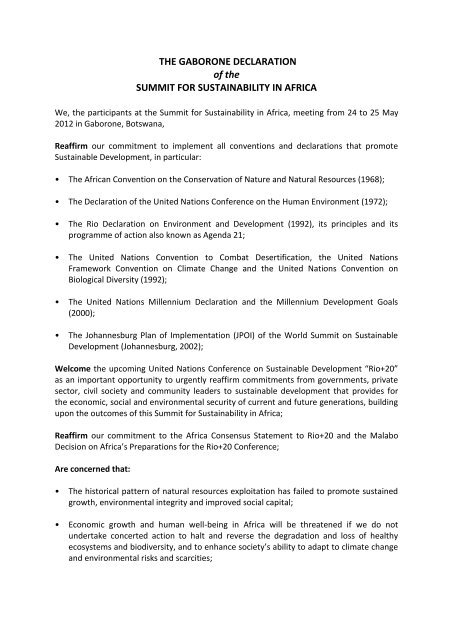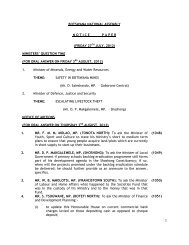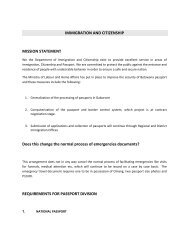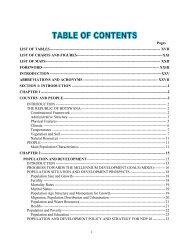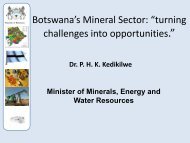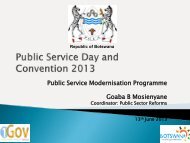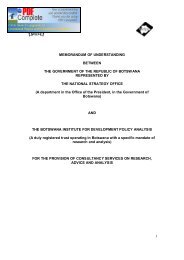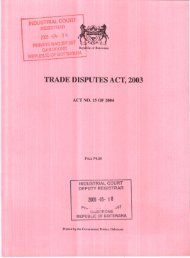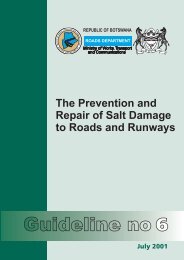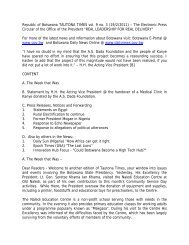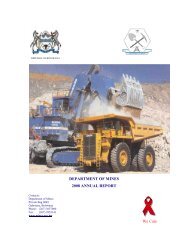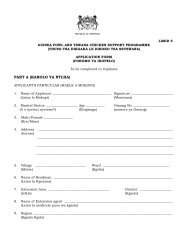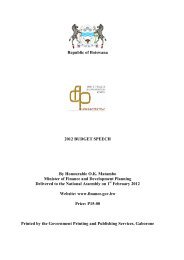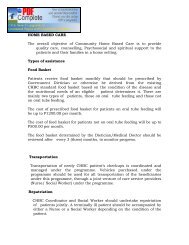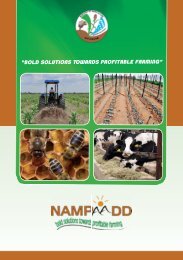the gaborone declaration of the summit for sustainability in africa
the gaborone declaration of the summit for sustainability in africa
the gaborone declaration of the summit for sustainability in africa
Create successful ePaper yourself
Turn your PDF publications into a flip-book with our unique Google optimized e-Paper software.
THE GABORONE DECLARATION<br />
<strong>of</strong> <strong>the</strong><br />
SUMMIT FOR SUSTAINABILITY IN AFRICA<br />
We, <strong>the</strong> participants at <strong>the</strong> Summit <strong>for</strong> Susta<strong>in</strong>ability <strong>in</strong> Africa, meet<strong>in</strong>g from 24 to 25 May<br />
2012 <strong>in</strong> Gaborone, Botswana,<br />
Reaffirm our commitment to implement all conventions and <strong>declaration</strong>s that promote<br />
Susta<strong>in</strong>able Development, <strong>in</strong> particular:<br />
• The African Convention on <strong>the</strong> Conservation <strong>of</strong> Nature and Natural Resources (1968);<br />
• The Declaration <strong>of</strong> <strong>the</strong> United Nations Conference on <strong>the</strong> Human Environment (1972);<br />
• The Rio Declaration on Environment and Development (1992), its pr<strong>in</strong>ciples and its<br />
programme <strong>of</strong> action also known as Agenda 21;<br />
• The United Nations Convention to Combat Desertification, <strong>the</strong> United Nations<br />
Framework Convention on Climate Change and <strong>the</strong> United Nations Convention on<br />
Biological Diversity (1992);<br />
• The United Nations Millennium Declaration and <strong>the</strong> Millennium Development Goals<br />
(2000);<br />
• The Johannesburg Plan <strong>of</strong> Implementation (JPOI) <strong>of</strong> <strong>the</strong> World Summit on Susta<strong>in</strong>able<br />
Development (Johannesburg, 2002);<br />
Welcome <strong>the</strong> upcom<strong>in</strong>g United Nations Conference on Susta<strong>in</strong>able Development “Rio+20”<br />
as an important opportunity to urgently reaffirm commitments from governments, private<br />
sector, civil society and community leaders to susta<strong>in</strong>able development that provides <strong>for</strong><br />
<strong>the</strong> economic, social and environmental security <strong>of</strong> current and future generations, build<strong>in</strong>g<br />
upon <strong>the</strong> outcomes <strong>of</strong> this Summit <strong>for</strong> Susta<strong>in</strong>ability <strong>in</strong> Africa;<br />
Reaffirm our commitment to <strong>the</strong> Africa Consensus Statement to Rio+20 and <strong>the</strong> Malabo<br />
Decision on Africa’s Preparations <strong>for</strong> <strong>the</strong> Rio+20 Conference;<br />
Are concerned that:<br />
• The historical pattern <strong>of</strong> natural resources exploitation has failed to promote susta<strong>in</strong>ed<br />
growth, environmental <strong>in</strong>tegrity and improved social capital;<br />
• Economic growth and human well-be<strong>in</strong>g <strong>in</strong> Africa will be threatened if we do not<br />
undertake concerted action to halt and reverse <strong>the</strong> degradation and loss <strong>of</strong> healthy<br />
ecosystems and biodiversity, and to enhance society’s ability to adapt to climate change<br />
and environmental risks and scarcities;
Recognize that:<br />
• Current development decisions are driven by fundamental human needs <strong>for</strong> food, water,<br />
energy, and health security as well as employment and economic growth;<br />
• The abovementioned development needs must be addressed with sufficient concern <strong>for</strong><br />
each o<strong>the</strong>r, <strong>for</strong> <strong>the</strong>ir impact on our peoples’ quality <strong>of</strong> life and our countries’ ecological<br />
health and productivity, and <strong>for</strong> <strong>the</strong> eradication <strong>of</strong> poverty and <strong>in</strong>equality;<br />
• Watersheds, <strong>for</strong>ests, fisheries, coral reefs, soils, and all natural resources, ecosystems<br />
and biodiversity constitute our vital natural capital and are central to long-term human<br />
well-be<strong>in</strong>g, and <strong>the</strong>re<strong>for</strong>e must be protected from overuse and degradation and, where<br />
necessary, must be restored and enhanced;<br />
Are <strong>in</strong> agreement that:<br />
• Urgent, concerted actions be undertaken to restore and susta<strong>in</strong> <strong>the</strong> ability <strong>of</strong> <strong>the</strong> Earth<br />
to support human communities, to ensure <strong>the</strong> long-term <strong>in</strong>tegrity <strong>of</strong> biodiversity and<br />
ecosystem services <strong>in</strong> effective protected area networks, to mitigate environmental risks<br />
and scarcities, and <strong>the</strong>reby to contribute to <strong>the</strong> prosperity <strong>of</strong> future generations;<br />
• These actions must be led by countries as a tenet <strong>of</strong> <strong>the</strong>ir sovereign self-<strong>in</strong>terest and <strong>in</strong><br />
alliance with <strong>the</strong> community <strong>of</strong> nations, respect<strong>in</strong>g common but differentiated<br />
responsibilities;<br />
Recognize that:<br />
• The abovementioned actions must <strong>in</strong>crease our knowledge, technology, tools, and<br />
capacities to value and manage natural capital and to susta<strong>in</strong>ably improve our citizens’<br />
economic and social well-be<strong>in</strong>g;<br />
• Effective governance and equity are essential to achiev<strong>in</strong>g <strong>the</strong>se goals <strong>of</strong> susta<strong>in</strong>able<br />
development;<br />
• Disparities <strong>in</strong> economic growth and development priorities are evident between <strong>the</strong><br />
developed and develop<strong>in</strong>g countries;<br />
• The engagement <strong>of</strong> governments and citizens along with <strong>the</strong> dedicated support <strong>of</strong> <strong>the</strong><br />
private sector and o<strong>the</strong>r <strong>in</strong>vestors, donors and advisors is vital to <strong>the</strong> success <strong>of</strong> this<br />
collective vision;<br />
• This vision must translate <strong>in</strong>to actions that are specific, targeted, and timely;<br />
Hereby undertake to pursue <strong>the</strong> follow<strong>in</strong>g overarch<strong>in</strong>g objective and concrete actions, <strong>in</strong><br />
cooperation with o<strong>the</strong>r countries and partners, and to share <strong>in</strong><strong>for</strong>mation on progress on<br />
<strong>the</strong>se actions on an annual basis:
Through:<br />
To ensure that <strong>the</strong> contributions <strong>of</strong> natural capital to susta<strong>in</strong>able economic<br />
growth, ma<strong>in</strong>tenance and improvement <strong>of</strong> social capital and human well-be<strong>in</strong>g<br />
are quantified and <strong>in</strong>tegrated <strong>in</strong>to development and bus<strong>in</strong>ess practice<br />
• Integrat<strong>in</strong>g <strong>the</strong> value <strong>of</strong> natural capital <strong>in</strong>to national account<strong>in</strong>g and corporate plann<strong>in</strong>g<br />
and report<strong>in</strong>g processes, policies, and programmes, <strong>in</strong> agreed ef<strong>for</strong>ts, <strong>in</strong>clud<strong>in</strong>g <strong>the</strong><br />
appended Communiqué on Natural Capital Account<strong>in</strong>g,<br />
• Build<strong>in</strong>g social capital and reduc<strong>in</strong>g poverty by transition<strong>in</strong>g agriculture, extractive<br />
<strong>in</strong>dustries, fisheries and o<strong>the</strong>r natural capital uses to practices that promote susta<strong>in</strong>able<br />
employment, food security, susta<strong>in</strong>able energy and <strong>the</strong> protection <strong>of</strong> natural capital<br />
through protected areas and o<strong>the</strong>r mechanisms,<br />
• Ecosystem restoration measures, as well as actions that mitigate stresses on natural<br />
capital,<br />
• Build<strong>in</strong>g <strong>the</strong> knowledge, data, capacity and policy networks to promote leadership and<br />
new models <strong>in</strong> <strong>the</strong> field <strong>of</strong> susta<strong>in</strong>able development, and to <strong>in</strong>crease momentum <strong>for</strong><br />
positive change,<br />
• Effective communication and public education.<br />
Each <strong>of</strong> us, no matter our stage <strong>of</strong> development, will start to implement this agreement,<br />
consistent with our respective capacities and resources;<br />
In recognition <strong>of</strong> <strong>the</strong> many encourag<strong>in</strong>g steps be<strong>in</strong>g taken towards susta<strong>in</strong>able development<br />
across <strong>the</strong> African cont<strong>in</strong>ent,<br />
We hereby encourage o<strong>the</strong>r nations to endorse this Gaborone Declaration and<br />
agree to jo<strong>in</strong> <strong>in</strong> <strong>the</strong>se <strong>in</strong>itiatives.<br />
Communiqué on Natural Capital Account<strong>in</strong>g<br />
Recogniz<strong>in</strong>g <strong>the</strong> limitations <strong>of</strong> GDP as a measure <strong>of</strong> well-be<strong>in</strong>g and susta<strong>in</strong>able growth that<br />
values environmental and social aspects <strong>of</strong> progress;<br />
Underscor<strong>in</strong>g <strong>the</strong> importance <strong>of</strong> natural capital account<strong>in</strong>g as a tool <strong>for</strong> ma<strong>in</strong>stream<strong>in</strong>g<br />
natural capital <strong>in</strong>to <strong>in</strong><strong>for</strong>med economic decision-mak<strong>in</strong>g;<br />
Recogniz<strong>in</strong>g <strong>the</strong> adoption by <strong>the</strong> UN Statistical Commission <strong>of</strong> <strong>the</strong> 2012 System <strong>of</strong><br />
Environmental-Economic Accounts (SEEA) central framework as <strong>the</strong> <strong>in</strong>itial version <strong>of</strong> <strong>the</strong><br />
<strong>in</strong>ternational standard <strong>for</strong> environmental-economic accounts, subject to fur<strong>the</strong>r revision,
acknowledg<strong>in</strong>g that fur<strong>the</strong>r improvements on measurement are necessary on specific<br />
issues;<br />
Not<strong>in</strong>g <strong>the</strong> challenge to build national <strong>in</strong>stitutional capacity to implement <strong>the</strong> SEEA,<br />
<strong>in</strong>clud<strong>in</strong>g <strong>the</strong> organization and collection <strong>of</strong> data, and to demonstrate its benefits to policy<br />
makers;<br />
Appreciat<strong>in</strong>g that <strong>the</strong>re are many successful experiences and best practices on natural<br />
capital account<strong>in</strong>g and that a key challenge we face is how to scale up, replicate and adapt<br />
what we know works;<br />
Welcom<strong>in</strong>g that Rio+20 <strong>of</strong>fers an important opportunity <strong>for</strong> <strong>the</strong> <strong>in</strong>ternational community to<br />
mobilize support <strong>for</strong> <strong>the</strong> implementation <strong>of</strong> previously stated commitments to<br />
implement<strong>in</strong>g natural capital account<strong>in</strong>g.<br />
Hereby:<br />
Invite Governments, <strong>the</strong>ir respective accountancy standards bodies, and <strong>the</strong> United Nations<br />
system, <strong>in</strong>clud<strong>in</strong>g <strong>in</strong>ternational f<strong>in</strong>ancial <strong>in</strong>stitutions, and o<strong>the</strong>r <strong>in</strong>ternational organizations,<br />
as appropriate, work<strong>in</strong>g <strong>in</strong> partnership with Major Groups and o<strong>the</strong>r stakeholders to take<br />
action as follows:<br />
• Develop <strong>in</strong>stitutional arrangements to streng<strong>the</strong>n <strong>the</strong> implementation <strong>of</strong> natural<br />
capital account<strong>in</strong>g;<br />
• Develop science-based methodologies on an experimental basis <strong>for</strong> ecosystem<br />
account<strong>in</strong>g as a complement to GDP and corporate per<strong>for</strong>mance;<br />
• Pilot and demonstrate <strong>the</strong> economic, social and environmental aspects <strong>of</strong> scaled up<br />
and <strong>in</strong>tegrated approaches to natural capital account<strong>in</strong>g.<br />
Fur<strong>the</strong>r <strong>in</strong>vite <strong>the</strong> United Nations Statistical Commission to assist <strong>in</strong> <strong>the</strong> implementation <strong>of</strong><br />
<strong>the</strong> SEEA and to provide support <strong>for</strong> <strong>the</strong> tra<strong>in</strong><strong>in</strong>g <strong>of</strong> national accountants, environmental<br />
statisticians and national technical staff.<br />
National Representatives and Signatory Countries<br />
His Excellency Lt. Gen. Seretse Khama Ian Khama<br />
President <strong>of</strong> <strong>the</strong> Republic <strong>of</strong> Botswana<br />
Her Excellency Ellen Johnson Sirleaf<br />
President <strong>of</strong> Liberia<br />
His Excellency Hifikepunye Pohamba<br />
President <strong>of</strong> Namibia
His Excellency Mohamed Gharib Bilal<br />
Vice President <strong>of</strong> Tanzania<br />
His Excellency Aires Ali<br />
Prime M<strong>in</strong>ister <strong>of</strong> Mozambique<br />
Hon. Stanislas Kamanzi<br />
M<strong>in</strong>ister <strong>of</strong> Natural Resources <strong>of</strong> Rwanda<br />
Hon. Emmanuel Issoze Ngondet<br />
M<strong>in</strong>ister <strong>of</strong> Foreign Affairs, International Cooperation and Francophony <strong>of</strong> Gabon<br />
Hon. Njeru Githae<br />
M<strong>in</strong>ister <strong>of</strong> F<strong>in</strong>ance <strong>of</strong> Kenya<br />
Hon. Edna Molewa<br />
M<strong>in</strong>ister <strong>of</strong> Water and Environmental Affairs, South Africa<br />
Hon. Sherry Ayittey<br />
M<strong>in</strong>ister <strong>of</strong> Environment, Science and Technology, Ghana<br />
Representatives and Support<strong>in</strong>g Institutions<br />
Hon. Heikki Holmås, M<strong>in</strong>ister <strong>of</strong> International Development, Government <strong>of</strong> Norway<br />
Peter Seligmann, Chairman, CEO and Founder, Conservation International<br />
Laurene Powell Jobs, Chair and Founder, Emerson Collective<br />
S. Robson Walton, Chairman, Wal-Mart<br />
Achim Ste<strong>in</strong>er, Executive Director, United Nations Environment Programme<br />
Rachel Kyte, Vice President, Susta<strong>in</strong>able Development, The World Bank<br />
Barry Lowenkron Vice President, International Programs, MacArthur Foundation<br />
Sam Dryden, Director, Agricultural Development, Bill & Mel<strong>in</strong>da Gates Foundation<br />
Maria Helena Semedo, Assistant Director-General, Food and Agriculture Organization<br />
<strong>of</strong> <strong>the</strong> United Nations<br />
Dirk Messner, Director, German Development Institute<br />
Pavan Sukhdev, Founder and Chair, GIST Advisory
Simon Susman, Chairman, Woolworths Hold<strong>in</strong>gs Ltd<br />
Loyiso Ndlovu, Executive Director, Isi<strong>the</strong>be Trust<br />
Kev<strong>in</strong> Cleaver, Associate Vice-President, International Fund <strong>for</strong> Agricultural Development<br />
Suresh Rajapakse VP <strong>of</strong> Safety, Health, Environment, Security and Susta<strong>in</strong>ability,<br />
ArcelorMittal<br />
Graham Wynne, Senior Advisor, The Pr<strong>in</strong>ce’s Charities International Susta<strong>in</strong>ability Unit<br />
(ISU)<br />
Sara Scherr, President, EcoAgriculture Partners<br />
Sarah Frazee, CEO, Conservation South Africa<br />
…. ALL PARTICIPATING INSTITUTIONS (UPON AGREEMENT)<br />
Jurgen Rigter<strong>in</strong>k, Chief Investment Officer, FMO<br />
Dougie Brew, External Affairs Director, Africa Unilever<br />
Stephen Muchiri, Chief Operat<strong>in</strong>g Officer, Eastern Africa Farmers Federation<br />
Charles Owubah, Regional Vice President <strong>for</strong> East Africa, World Vision<br />
Andrew Venter, Dr / CEO, Wildlands Conservation Trust<br />
Ann Davl<strong>in</strong>, Director, Carbon War Room<br />
Arne Cartridge, Special Advisor, World Economic Forum<br />
Johann Viljoen, Senior Vice President SHE & SD, Anglo-Gold Ashanti<br />
Grant Pattison, President and CEO, Wal-mart South Africa<br />
Gerard van Empel Manag<strong>in</strong>g Director, Rabo Development and RAIS<br />
Jane Karuku, President, Alliance <strong>for</strong> a Green Revolution <strong>in</strong> Africa
Alex Awiti, Faculty Member, Aga Khan University<br />
Ali A. Kaka, Regional Director, IUCN<br />
Charles Meshack, Executive Director, Tanzania Forest Conservation Group<br />
Sarah Dunn, Head <strong>of</strong> Office, Department <strong>for</strong> International Development-South Africa<br />
Sara Clancy, Manager, Africa Department International F<strong>in</strong>ance Corporation<br />
Aupa Monyatsi, Act<strong>in</strong>g Manag<strong>in</strong>g Director, Barclays Bank <strong>of</strong> Botswana<br />
Rav<strong>in</strong><strong>the</strong>ran Pillay, Corporate Affairs Director, Nestle- South Africa<br />
Michelle Adelman, Founder, Accite Hold<strong>in</strong>gs<br />
Alex Miston Banda, Senior Program Officer, Sou<strong>the</strong>rn African Development Community


